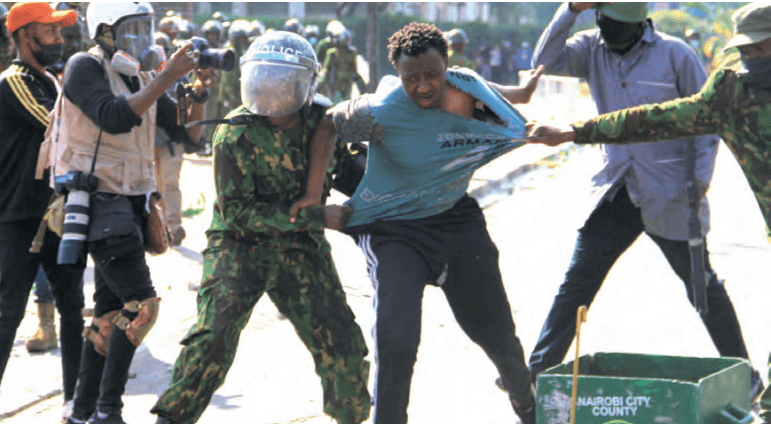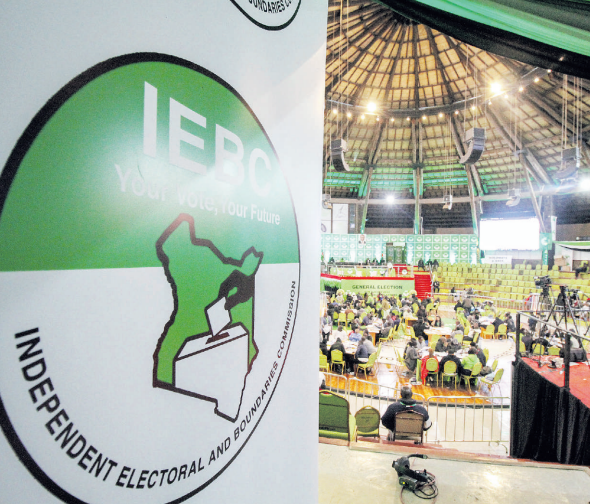

Polls agency IEBC has disclosed plans to register about 5.6 million new voters for the 2027 general elections.
The revelation gives a sneak peek into the numbers every presidential candidate will spend sleepless nights creating plans to woo, as they will be at the centre of the political battle.
Traditionally, IEBC’s new registrations focus on persons who have attained voting age after a previous election.
The commission seeks to register 2,270,000 new voters in the financial year starting July 1.
According to budget sector reports Treasury is evaluating, IEBC proposes to register 3,409,443 new voters in the subsequent year.
This brings the total of new registrations to 5,679,443, mostly comprising youth, popularly known as Gen Z.
If achieved to the last digit, the number of registered voters would increase to 27,799,901, considering there were 22,120,458 registered for the 2022 election.
The final phase of the registration will coincide with the 2027 elections, where the new numbers will either make or destroy careers from the race for president to MCA.
Pundits believe the nation’s young people will have far-reaching influence in the 2027 polls, not only through their input in social media campaigns but also in the voting trends and preferences.
“The people who will emerge tops are those who will relate well, show or prove or resolve, or look believable in handling the issues Gen Z have raised,” political analyst Charles Munyui said.
“Those who resonate with those issues will have an advantage. I don’t think it will be wise to assume that the youths will not participate in the elections.”
Meru politician Winnie Kaburu, who was James Ole Kiyiapi’s running mate in the 2013 presidential election, said the question will be whether or not the youths will have been handed the national identity cards via which they can register as voters.
“They will tilt the election, especially having made their voice heard. The new numbers will be a big difference…these people cannot be bought. It will be a surprise… only that most of them don’t have IDs,” Kaburu said.
Big names in the country’s political space have already embarked on an all-out war to win Gen Z. Candidates who have expressed interest in unseating President William Ruto are eyeing the youthful populace as a game-changer.
Wiper leader Kalonzo Musyoka, Narc Kenya leader Martha Karua, Uhuru Kenyatta-era Interior CS Fred Matiang’i, and Busia Senator Okiya Omtatah are seeking to win over the Gen Z vote to unseat Ruto.
During the launch of his presidential bid, youthful activists stated he would be their candidate of choice.
“Okiya resonates with all of us Gen Zs. Whatever he has been fighting for resonates with our desire for a better Kenya,” activist Hanifa Adan said.
The Busia lawmaker said his eyes were fixed on the youth vote, which President Ruto is also fighting to win over. Kalonzo and impeached DP Rigathi Gachagua have also fashioned themselves as having solutions for the young people.
Gen Z have in social media spaces shown admiration for Matiang’i, who is also preparing for a face-off with Ruto.
Their relevance as a force to infl uence politics was demonstrated during the June anti-tax demonstrations that nearly grounded the Ruto administration. Their prowess in mobilisation, through social media platforms like X, WhatsApp, TikTok and Instagram, played out prominently.
Political commentator Javas Bigambo said while the youth will reshape the political landscape and redefi ne the outcome of future polls, their turnout would matter most.
“They will be a strong vote that will determine who is in and who is out if they mobilise themselves away from tribe, region and party.”
An analysis of election data reveals fewer Kenyans turned out to vote in 2022 compared to previous ones. In 2022, the turnout was 65 per cent, which was about 15 per cent lower than the 80 per cent reported in the 2017 general election.
IEBC statistics show elections in 2013 attracted 86 per cent of the registered voters, while the 2010 referendum had 72 per cent.
The much-referenced 2007 election had a turnout of 69 per cent and was hailed as one where most Kenyans voted for the fi rst time.
This followed the reforms in the electoral process leading to the birth of the Electoral Commission of Kenya, which later scaled up voter listing.
A review of the Kenya population census data shows about eight million more young people will be of voting age by 2027. Even so, with IEBC projecting to list 5.6 million, about three million risk being locked out.
The projected numbers could be a pipedream. Despite the budget plans, voter registration – meant to be done regularly - is at stake as IEBC has no commissioners. In its 2023 report, the Hussein Marjan-led IEBC secretariat said they couldn’t list new voters due to the absence of commissioners.
“During the year under review, the commission did not conduct continuous voter registration. This was attributed to the commission not being constituted,” the report reads.
IEBC managers further cited budget cuts following austerity measures announced by President Ruto as having hampered the listing.
The IEBC situation has morphed into a constitutional crisis, especially amid the missed deadline for boundary review.
A court is expected to rule on January 25 on the matter, which is delaying the constitution of a panel to recruit the new commissioners and the chairperson.
At least 11 by-elections including for Ugunja, Magarini and Banisa MPs are pending, which legal experts say denies residents their right to representation.
Raila Odinga’s ODM party is the latest to bemoan the crisis, saying crucial preparations for the 2027 elections would be affected.
“We urge the Judiciary to expedite the resolution of the cases stopping the empanelment. The new commissioners will require time to settle in and begin preparations for the general election,” ODM secretary general Edwin Sifuna said.
Apart from commissioners, IEBC has in the past lamented that budgetary constraints have also limited the number of newly registered voters.
In November 2021, the commission said it costs Sh1,000 on average to enlist one voter, an amount that could go up considering inflation.
The next elections, according to the Governance, Justice, Law and Order sector report, could cost taxpayers about Sh40 billion.
IEBC has been allocated Sh4.2 billion in the coming fi nancial year for voter registration and electoral operations. About Sh17.6 billion is planned for the fi nancial year 2026-27 and another Sh17.9 billion for the subsequent spending period.
The amounts are besides budgets for voter education, general administration, and electoral ICT. ICT budgets are tentatively set at Sh10 billion for the coming fi nancial year and about Sh4.5 billion for the next two spending years.
The commission said it was
forced to scale down key preparatory activities as a result of this
year’s budget cuts.











